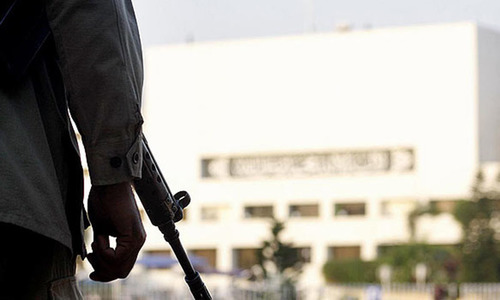ISLAMABAD: The United Nations has asked Pakistan to ratify the International Convention for the Protection of All Persons from Enforced Disappearance, and allocate adequate human, technical and financial resources for developing, adopting and implementing measures to prevent and end enforced disappearances among ethnic minority groups and ensure their safety and security.
At a meeting in Geneva on Friday, the UN Committee on the Elimination of Racial Discrimination issued its findings on Pakistan, asking Islamabad to adopt all measures necessary to investigate and prosecute all reports of enforced disappearances of ethnic and ethno-religious leaders, politicians, public officials, and human rights defenders and ensure that those convicted are held accountable and receive penalties commensurate with the crime.
The UN panel also recommended that the Pakistan government should ensure that victims and their families receive appropriate reparations, including cessation, guarantees of non-repetition, restitution, compensation, satisfaction and rehabilitation.
The UN committee also asked the government of Pakistan to repeal or reform its blasphemy laws, in particular those that impose severe penalties such as life imprisonment or the death penalty, to ensure that the crimes are not broad and vague and are in accordance with international human rights standards.
UN committee releases findings on country’s implementation of convention on racial discrimination
The committee further recommended the government to take all necessary measures to prevent violent attacks and reprisals against persons accused of blasphemy, in particular those under police custody or in detention, such as the adoption of Standard Operating Procedures for police and law-enforcement in cases concerning blasphemy.
Highlighting rising incidents in Punjab and Khyber-Pakhtunkhwa from May to June 2024, the committee underscored its concern over blasphemy accusations and subsequent cases of mob lynching of accused and destruction of places of worship, particularly targeting ethnic and ethno-religious minorities.
The UN body questioned the impunity for these crimes, citing few arrests and convictions. It underlined the right to fair trial of those accused of blasphemy, highlighting its concerns over the treatment of suspects, including deaths in police custody and prolonged legal proceedings.
The committee also recommended that Pakistan adopt measures to address the systemic and structural barriers to equal participation in public and political affairs by candidates and public officials belonging to ethnic minority groups, such as by reserving a proportionate number of seats for candidates belonging to ethnic minority groups.
The UN panel also asked the government to reduce poverty and unemployment among ethnic minority groups, including the Sheedi and Baloch, by facilitating equal access to employment opportunities and training and support for small business development; adopt institutional measures to increase reinvestment into local communities, including in Baloch, of revenues from the exploitation of natural resources and require thorough consultations of affected communities with a view to obtaining their free, prior, and informed consent before granting licences; and improve housing and living conditions in areas where ethnic minority groups reside by improving their infrastructure and access to basic social welfare services, including clean water, sanitation, and electricity.
It also asked Pakistan to prevent and combat discriminatory employment and advertisement practices based on racist stereotypes, particularly those targeting non-Muslim ethnic minorities for sanitation work and ensure that, prior to granting licences for projects involving the development and exploitation of natural resources, the communities concerned are consulted and independent and impartial studies are conducted on the social, environmental and cultural impact that such projects may have on the traditional ways of life and livelihoods of the ethnic groups that are particularly affected.
Pakistan should also take effective measures to investigate all complaints of harassment, intimidation and excessive use of force by security and law-enforcement officials deployed at checkpoints.
Published in Dawn, August 24th, 2024












































